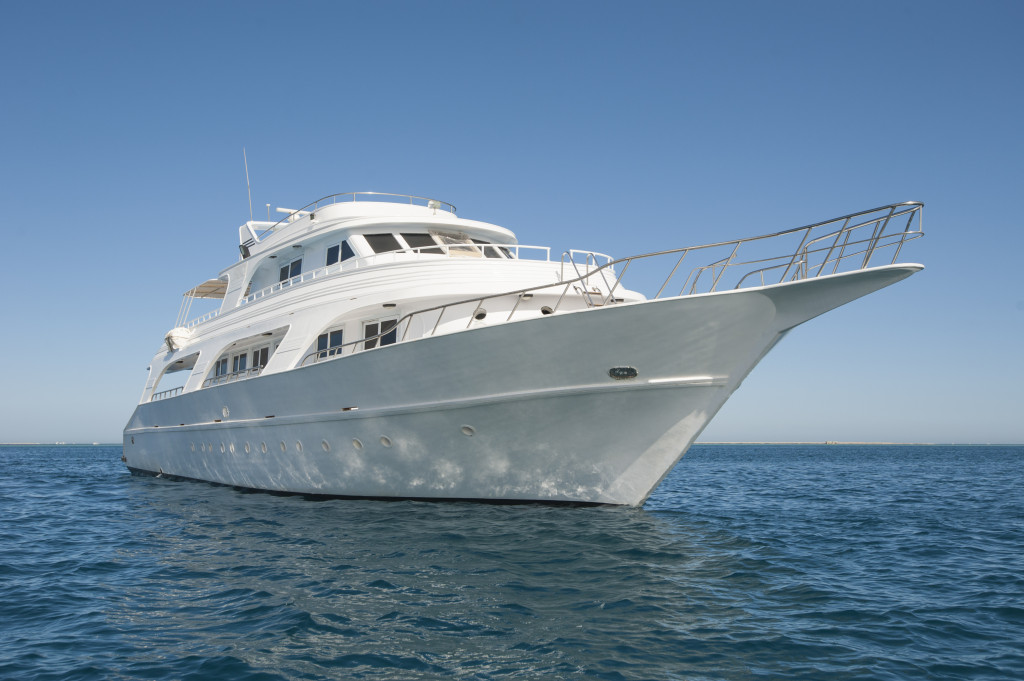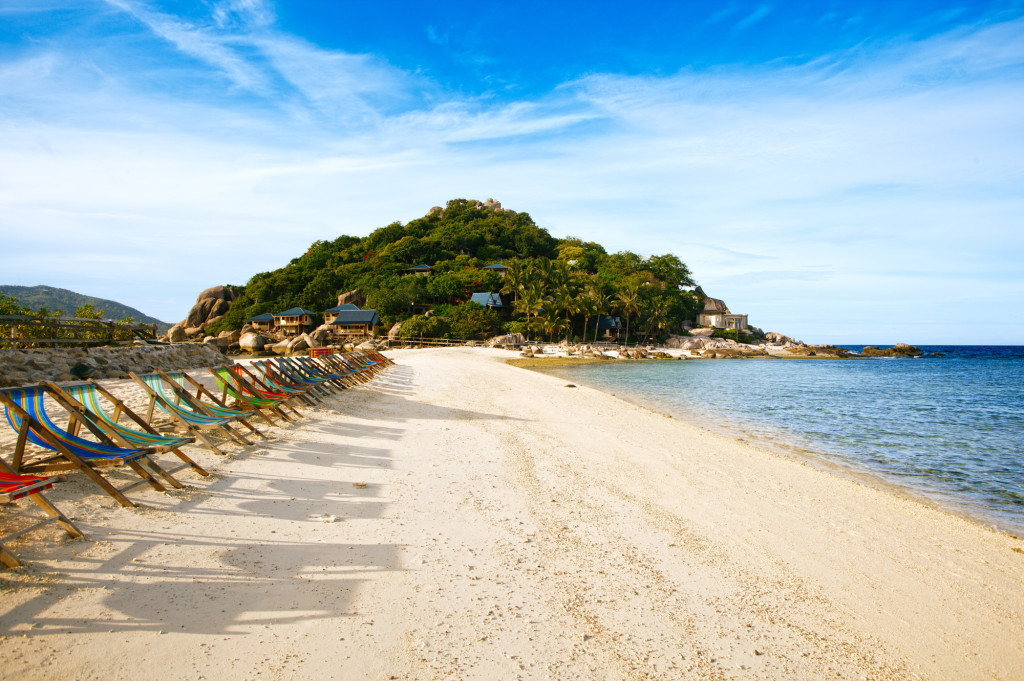Liveaboard diving versus resort diving is one of the first choices a vacationing diver must make. Is there particular marine life you hope to see? Is there a seasonal component to your planned destination? Based on your diving desires, whether or not your dream scuba trip includes a liveaboard vessel or a dive resort will be one of your first major decisions.
Factors that influence your decision may include your experience and confidence levels, your traveling partner/s, whether you want to experience other aspects of your destination as well as the diving, and how well you cope with living in close quarters with strangers. Depending on where you want to go, you may find that the choice between a liveaboard and a resort vacation is taken out of your hands — destinations like Costa Rica’s Cocos Island, for example, are only accessible by liveaboard charter. For all those destinations where there are equal opportunities for both resort and liveaboard diving, however, here’s a simplified list of pros and cons to help make your choice a little easier.
Liveaboard Diving

Pros
– Liveaboard charters are a great option for diehard divers who want to spend as much time in the water as possible. By taking up residence on the ocean, you’ve got dive sites — quite literally — on your doorstep. And because you don’t have to waste time traveling to and from sites each morning, you have more time to explore them. Many liveaboards offer “unlimited diving,” which usually translates to a maximum of five dives per day, including night dives.
– Often, choosing a liveaboard opens the door to a whole range of dive sites that are too remote for land-based resorts. Due to their typically offshore location, these exclusive sites often offer some of the best places to catch big pelagic action, and in some areas, they’re the only place to do so. There are some other major benefits to visiting these far-flung locations: less traffic, uncrowded dive sites, more pristine reefs and, of course, the sense of adventure that comes with diving off the beaten track.
– Liveaboards are usually the best option for underwater photographers, specifically those boats with itineraries geared especially towards photography enthusiasts. These trips will not only take you to unusual sites and allow you maximum in-water time, but also often include the advice of a professional to help you get the very best out of your images.
– Although they can be more expensive than land-based options, liveaboards are almost always all-inclusive, meaning that once you step aboard, everything from your accommodation to your meals and beverages is already taken care of. With the exception of extras like trip DVDs, this means that your vacation is paid for upfront, making money concerns less stressful once you’ve arrived.
– Fellow liveaboard passengers will usually be like-minded, enthusiastic divers, among whom camaraderie and lifelong friendships often develop. For this reason, single travelers may find liveaboards an excellent option, providing good company and readymade buddies.
Cons
– For some people, the rigid itineraries of most liveaboard charters can prove irritating, taking away your freedom to choose when and what you want to eat, for example. Sometimes, weather conditions or other unforeseeable circumstances can mean that sections of the itinerary are altered or cancelled completely, meaning that you might not get exactly what you signed up for.
– Liveaboards frequently include high-quality meals and luxury accommodation, often making them an expensive choice for the budget traveler. The costs of fuel on trips that last for a week or longer can also ratchet up liveaboard prices, and put them out of range for some divers.
– If you suffer from seasickness, a liveaboard charter may not be the best option for you. Taking the appropriate medication is enough to ward off the symptoms for some, but for others no dive site in the world is worth feeling nauseous and debilitated for the duration of their vacation.
– Often, no matter how luxurious your liveaboard is, it will not be able compete with the amenities of a land-based resort; if calling room service is important to you, a liveaboard may not be the best option. Lack of space can lead to necessarily cramped accommodation, while basic plumbing and the discomfort caused by bad weather are occupational hazards of life at sea.
– While your fellow passengers are often one of the best things about liveaboard diving, they can also be the worst. If personality clashes occur, there is very little space to escape each other, and very little privacy to retreat to if needs be.
Resort Diving
Pros
-While there are certainly some fantastically luxurious (and therefore incredibly expensive) resort options out there, it’s often easier to find a budget-resort package than it is to find an equally affordable liveaboard option. For those with limited resources, land-based diving is a good option as it allows you to seek out meals and accommodation to suit your budget. Additionally, while liveaboards often run for a week, you can easily tailor the length of your vacation to your own time constraints at a dive resort.
– Comfort is a big pro of resort diving, affording the stability and space of life on dry land. Sufferers of seasickness are not the only ones to appreciate such advantages; for many people, a dive vacation must incorporate ample time for rest and relaxation as well as for underwater exploration.
– Privacy, and the ability to interact as much or as little as you like with the people you meet while abroad, is another pro of resort diving. Often there are plenty of opportunities to meet new people through organized events; equally, you have the freedom to do your own thing if you’d prefer.
– Resort diving provides a good compromise for those divers whose partners, families or friends do not dive, or who prefer to snorkel only. While you’re enjoying a morning’s diving, your traveling companions can spend their time exploring the local area, relaxing on the beach or indulging their own land-based interests. For those traveling with kids, resort diving is often the best way to keep everyone in the family happy.
– For those who want to experience more of a country than just its underwater attractions, resort diving provides a good base from which to explore the local culture, to sample local cuisine, or make trips inland to other places of interest.
Cons
– While many destinations boast spectacular shore-diving opportunities, in some places the most famous offshore sites are not feasible options for land-based operations. Time is the limiting factor for resort divers as the length of the journey to more distant sites puts them out of range for day-trippers. As a result, deeper sites with a reputation for excellent pelagic action, or remote sites with exceptional coral growth could be off-limits.
– Because boat trips out to dive sites often take up a lot of time, resort divers can complete fewer dives per day. Instead of five dives a day, you may find yourself limited to two or three.
– Whereas liveaboard charters often have dive sites to themselves, the more accessible sites available to resort divers could prove much more crowded. It is possible too that as a result of increased exposure to tourism, inshore reefs may be degraded and therefore less diverse in terms of the creatures that call them home.
Considerations
This list of pros and cons generalizes both liveaboard and resort diving experiences, and of course there are always exceptions to the rule. In some places, diving from shore is every bit as rewarding as diving from a liveaboard, and some liveaboard itineraries make a real effort to include cultural trips ashore to allow for a more rounded insight into your chosen destination. Whichever option you choose, make sure that you know exactly what you’re signing up for so that you can be sure you’ll get what you want out of your time abroad. Regardless of whether you choose a liveaboard or a resort for your scuba vacation, make sure you choose a reputable operation with experienced staff, reliable equipment and environmentally sound practices. Seek the advice of others who have done that specific trip before, and take their recommendations into consideration without losing sight of your personal requirements. Most of all, remember that both options have the potential to provide the experience of a lifetime, and while different, can be equally unforgettable.
Do you prefer land-based or liveaboard diving? Tell us why!


